Unit 2: Hades and the Underworld

Vocabulary in Context
These sentences are from the next reading. Use the context of the topic and the sentence to guess the meaning of the words in bold.
- But as the Titans were bound by chains, their children remained free to wander the earth.
- He found them living in caves and in holes of the earth, shivering in the cold because there was no fire, dying of starvation, hunted by wild beasts and by one another – the most miserable of all living creatures.
- As he was walking by the shore of the sea he found a fennel stalk, and when he had broken it off he saw that its hollow center was filled with a dry, soft core which would burn slowly and keep on fire a long time.
- He ordered his blacksmith Vulcan, whose forge was in the crater of a volcano, to take a lump of clay which he gave him, and mold it into the form of a woman.
- “Come now!” said Zeus, “let us all give some wonderful gift to this woman;” and he began by giving her life. Then the others came in their turn, each with a gift for the remarkable creature.
- They fluttered for a little while about the room and then flew away to find dwelling-places wherever there were homes.
Prometheus and Pandora
Adapted from Old Greek Stories by James Baldwin, $\ccpd$
In those old, old times, there lived two brothers who were not like other men, nor yet like those Mighty Ones who lived upon the mountain top of Olympus. They were the sons of one of those Titans who had fought against Zeus and been sent in chains to the strong prison of the Underworld, Tartarus. But as the Titans were bound by chains, their children remained free to wander the earth.
The name of the elder of these brothers was Prometheus, or Forethought; for he was always thinking of the future and making things ready for what might happen tomorrow, or next week, or next year, or it may be in a hundred years to come. The younger was called Epimetheus, or Afterthought; for he was always so busy thinking of yesterday, or last year, or a hundred years ago, that he had no care at all for what might come to pass after a while.
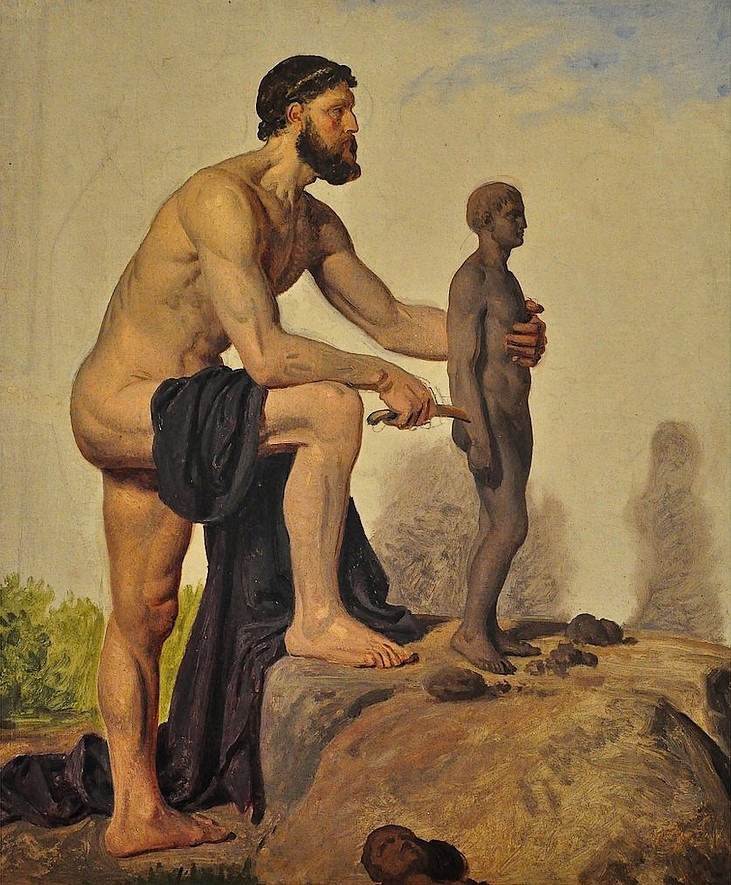
Prometheus did not care to live in the clouds on the mountain top. He was too busy for that. While the gods were spending their time in idleness, drinking nectar and eating ambrosia, he was intent upon plans for making the world wiser and better than it had ever been before. And so from the clay of the earth, Prometheus shaped smaller beings that looked like himself, and created the first men. From more clay he shaped beings that looked like his mother and his Titan aunts, and thus he also created women. His brother Epimetheus was in charge of creating the animals, and made them fast, gave them fur to keep them warm, and sharp teeth to defend themselves. But gods didn’t need these things, and so Prometheus didn’t give humans these qualities.
Prometheus went out among men to live with them and help them; for his heart was filled with sadness when he found that they were no longer happy as they had been during the golden days when Cronos was king. Ah, how very poor and pitiful they were! He found them living in caves and in holes of the earth, shivering in the cold because there was no fire, dying of starvation, hunted by wild beasts and by one another – the most miserable of all living creatures.
“If they only had fire,” said Prometheus to himself, “they could at least warm themselves and cook their food; and after a while they could learn to make tools and build themselves houses. Without fire, they are worse off than the beasts.” Then he bravely approached Zeus and begged him to give fire to men, so that they might have a little comfort through the long, dreary months of winter.
“Not a spark will I give,” said Zeus. “No, indeed! If men had fire, they might become strong and wise like us, and after a while they would drive us out of our kingdom. Let them shiver in the cold, and let them live like the beasts. It is best for them to be poor and ignorant, that so we gods may thrive and be happy.” Prometheus made no answer, but he had set his heart on helping mankind, and he did not give up. He turned away and left Zeus and his mighty company forever.
As he was walking by the shore of the sea he found a fennel stalk, and when he had broken it off he saw that its hollow center was filled with a dry, soft core which would burn slowly and keep on fire a long time. He took the long stalk in his hands, and started walking. “Mankind shall have fire in spite of the tyrant who sits on the mountain top,” he said.
He reached the place of the sun in the early morning just as the glowing, golden sphere was rising from the earth and beginning his daily journey through the sky. He touched the end of the long stalk to the flames, and the dry core caught on fire and burned slowly. Then he turned and hurried back to his own land, carrying with him the precious spark hidden in the hollow center of the plant.
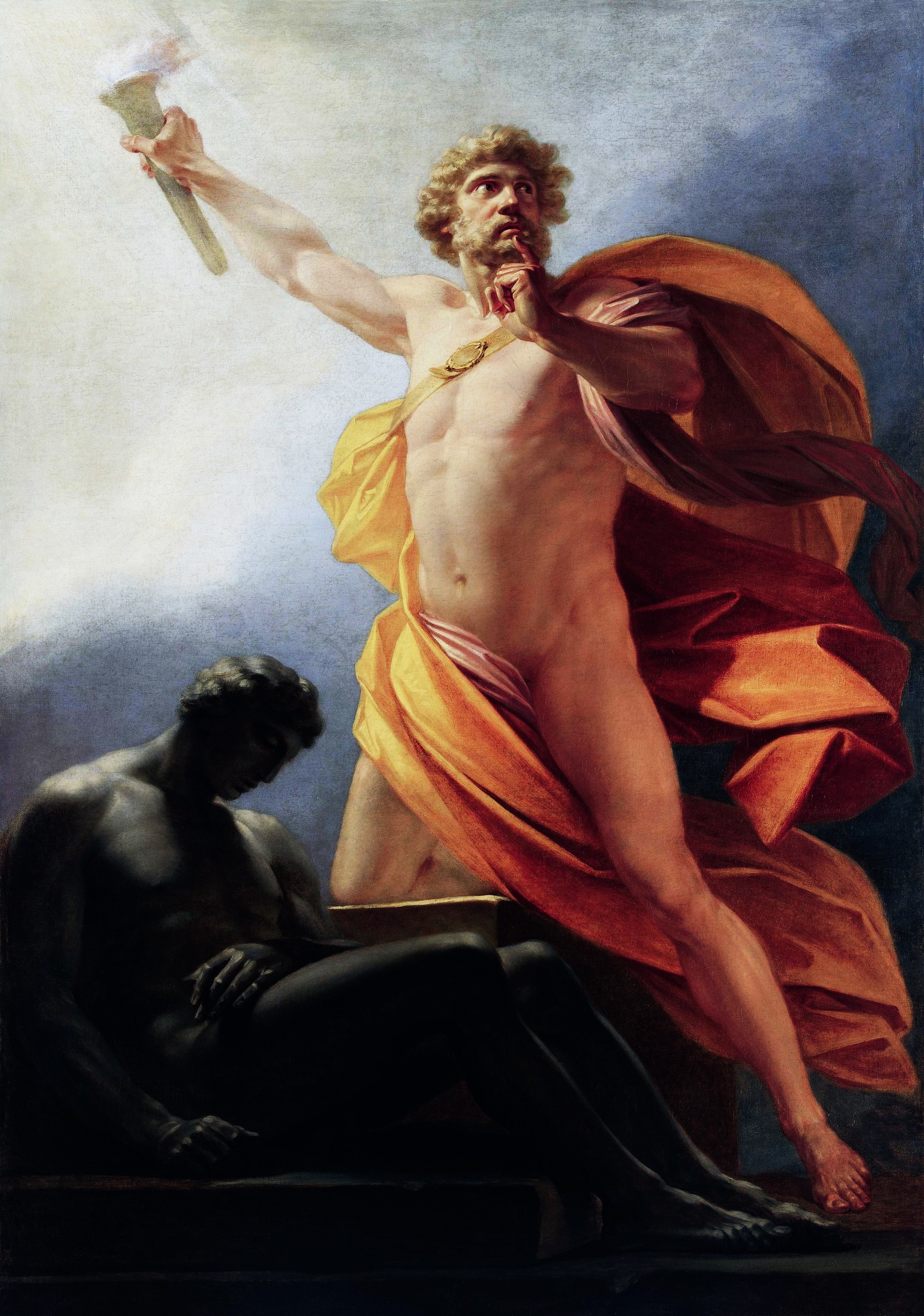
He called some of the shivering men from their caves and built a fire for them, and showed them how to warm themselves by it and how to build other fires from the coals. Soon there was a cheerful blaze in every home in the land, and men and women gathered around it and were warm and happy, and thankful to Prometheus for the wonderful gift which he had brought to them from the sun.
It was not long until they learned to cook their food and so to eat like men instead of like beasts. They began at once to leave behind their wild and savage habits; and instead of hiding in the dark places of the world, they came out into the open air and the bright sunlight, and were glad because life had been given to them.
After that, Prometheus taught them, little by little, a thousand things. He showed them how to build houses of wood and stone, and how to tame sheep and cattle and make them useful, and how to plow and sow and reap, and how to protect themselves from the storms of winter and the beasts of the woods. Then he showed them how to dig in the earth for copper and iron, and how to melt the ore, and how to hammer it into shape and fashion from it the tools and weapons which they needed in peace and war; and when he saw how happy the world was becoming he cried out: “A new Golden Age shall come, brighter and better by far than the old!”

Things might have gone on very happily indeed, and the Golden Age might really have come again, had it not been for Zeus. But one day, when he happened to look down upon the earth, he saw the fires burning, and the people living in houses, and the farms with animals feeding on the hills, and the grain ripening in the fields, and this made him very angry.
“Who has done all this?” he asked. And someone answered, “Prometheus!” “Well, I will punish him in a way that will make him wish I had shut him up in the prison with his parents. But as for those worthless humans, let them keep their fire. I will make them ten times more miserable than they were before they had it.”
Of course, it would be easy enough to deal with Prometheus at any time, and so Zeus was in no great hurry to do it. He made up his mind to make mankind suffer first, and he thought of a plan for doing it in a very strange, indirect way.
In the first place, he ordered his blacksmith Vulcan, whose forge was in the crater of a volcano, to take a lump of clay which he gave him, and mold it into the form of a woman. Vulcan did as he was ordered, and when he had finished the statue, he carried it up to Zeus, who was sitting among the clouds with all the gods around him. It was nothing but an ordinary lifeless body, but the great blacksmith had given it a form more perfect than that of any statue that has ever been made.
“Come now!” said Zeus, “let us all give some wonderful gift to this woman;” and he began by giving her life. Then the others came in their turn, each with a gift for the remarkable creature. One gave her beauty; and another a lovely voice; and another good manners; and another a kind heart; and another skill in many arts; and, lastly, someone gave her curiosity. Then they called her Pandora, which means the “all-gifted”, because she had received gifts from them all.
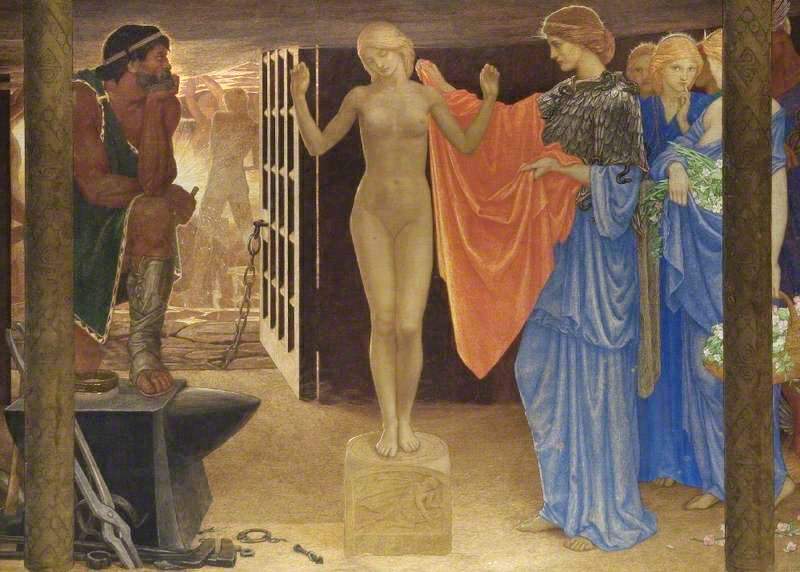 |
 |
Pandora was so beautiful and so talented that no one could help loving her. When the gods had admired her for a time, they gave her to the messenger Hermes, and he led her down the mountainside to the place where Prometheus and his brother were living and working hard for the good of mankind. He met Epimetheus first, and said to him: “Epimetheus, here is a beautiful woman whom Zeus has sent to you to be your wife.”
Prometheus had often warned his brother to beware of any gift that Zeus might send, for he knew that the mighty tyrant could not be trusted; but when Epimetheus saw Pandora, how lovely and wise she was, he forgot all warnings, and took her home to live with him and be his wife.
Pandora was very happy in her new home; and even Prometheus, when he saw her, was happy with her loveliness. She had brought with her a golden box, which Zeus had given her before she left Olympus, and which he had told her held many precious things, but wise Athena had warned her never, never to open it, nor look at the things inside.
“They must be jewels,” she said to herself; and then she thought of how they would add to her beauty if only she could wear them. “Why did Zeus give them to me if I should never use them, nor even look at them?” she asked.
The more she thought about the golden box, the more curious she was to see what was in it; and every day she took it down from its shelf and felt of the lid, and tried to examine inside of it without opening it.
“Why should I care about what Athena told me?” she said at last. “She is not beautiful, and jewels would be useless to her. I think I will look at them anyway. Athena will never know. Nobody will ever know.”

She opened the lid a little, just to peek inside. All at once there was a buzzing, rustling sound, and before she could shut it down again, out flew ten thousand strange creatures with death-like faces and bony and horrible forms that nobody in all the world had ever seen. They fluttered for a little while about the room and then flew away to find dwelling-places wherever there were homes. They were diseases and cares; until that time mankind had not had any kind of sickness, nor felt any troubles of mind, nor worried about what tomorrow might bring.
These creatures flew into every house, and, without anyone seeing them, nestled down in the minds and souls of men and women and children, and put an end to all their joy, and ever since that day they have been fluttering and creeping, unseen and unheard, over all the land, bringing pain and sadness and death into every household.

All that was left inside the box, lying in the bottom, was hope. Hope was the only thing that remained. It’s a shame that hope never left the box. And this was the way in which Zeus sought to make mankind more miserable than they had been before Prometheus had created them.
But Zeus didn’t forget about punishing Prometheus himself. He had Prometheus chained to a rock where an eagle would come and eat his liver, which was thought to be where emotions lie according to the ancient Greeks. Every day his liver would grow back, and every day the eagle would return to eat it once more.
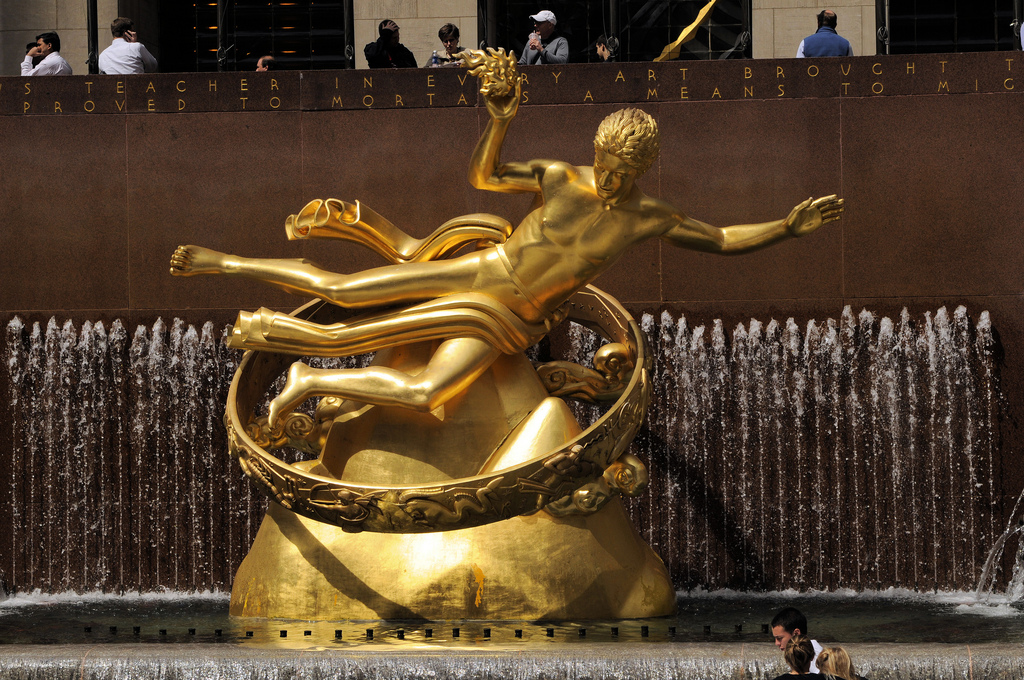
Comprehension Questions
Write your answer based on the previous reading. Check your answers with a partner.
- Who is Prometheus?
- Who is Epimetheus?
- What did Prometheus want to give to humans although Zeus disagreed?
- How did Prometheus give this gift to humans anyway?
- How did Zeus punish mankind for Prometheus’ betrayal?
- How did Zeus later punish Prometheus?
- Who is Pandora?
- What was the deal with the box she had?
- What happened when she opened the box?
- What remained at the bottom of the box?
Critical Thinking Questions
Answer the following questions. Compare your answers with a partner.
- What two phenomena does this story try to explain?
- What do you think is the moral of the story? (That is, what is the lesson to learn?)
- Google “Promethean World”, which is an educational company. Then answer the following questions about your findings.
- What do they provide?
- What do you notice about this company’s logo?
- Why do you think this company is named after Prometheus?
Vocabulary from the Stories
Answer the following questions about words and phrases that come from the story.
- Read the following from the Merriam-Webster Dictionary about the word “Promethean”:
As some versions of the story go in Greek mythology, Prometheus (one of the Titan giants) modeled humans from clay and then taught them agriculture and all the arts of civilization. He also stole fire from the gods and gave it to humans. So inventive was he that anything that bears the stamp of creativity and originality can still be called Promethean. Zeus, however, had wanted the human race to perish, so Prometheus’ actions were also disobedient. Hence Promethean can also mean defiant of authority or limits. As punishment for his disobedience, Zeus chained Prometheus to a rock where an eagle daily tore at his liver. Thus, any suffering on a grand scale can also be called Promethean – though this sense is not as common as the others.
Sometimes a famous inventor is called “a modern-day Prometheus”. Many people say Steve Jobs was like Prometheus. Who do you think is a modern-day Prometheus, and why?
- Do you know about Pandora Radio? Read below about their website. Why did they name their company after Pandora? (from: www.pandora.com/about)

- The “pan” in Pandora means “all”. We use this prefix in quite a few words in English. Look up the definition of these “pan” words and use them in a sentence.
- Panacea (who is also a Greek goddess!)
- Pandemic
- Panorama
- Pangaea (Pan + Gaea, do you remember her?)
- Pancultural
- Panoptic
- Pandemonium
- Do you know about the Pandora jewelry store? Why do you think they named this company “Pandora”?

Photo by Charity Davenport, $\ccbysa$ -
According to Wikipedia, “Today the phrase ‘to open Pandora’s box’ means to perform an action that may seem small or innocent, but that turns out to have severely detrimental and far-reaching negative consequences.”
What are personal examples of “opening Pandora’s box” you can give? What could be some political or scientific topics that “open Pandora’s box?
Analyzing Cartoons
With a classmate, discuss the meaning of the following cartoons. What topics are they talking about in the cartoons below? What do you know about the topic? How does it connect to the stories of Prometheus and Pandora?
 |
 |

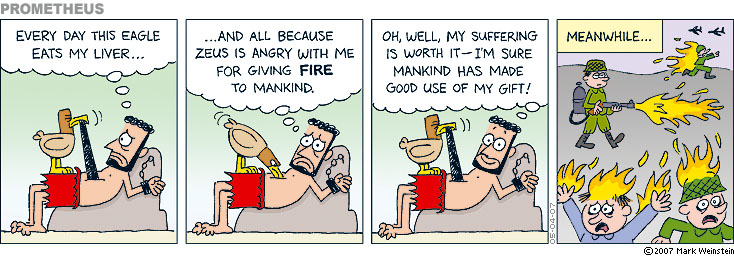
You can read more of Mark’s comics about Prometheus: https://prometheuscomic.wordpress.com/
CEFR Level: CEF Level B1
